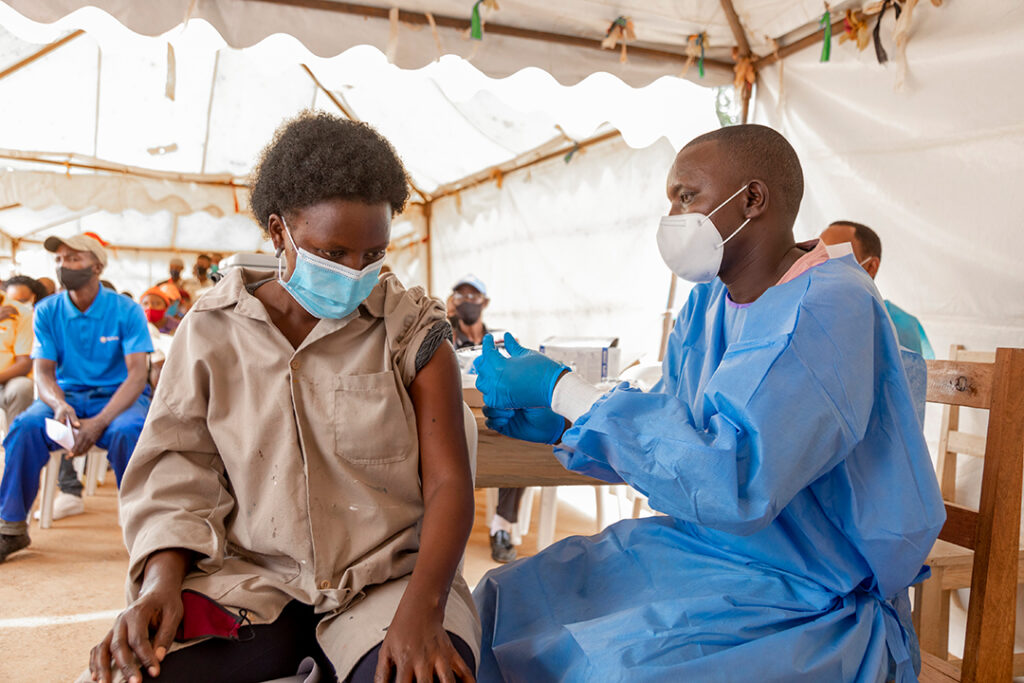ADF STAFF
Rwanda, which earned global praise for its response to the COVID-19 pandemic, is negotiating with vaccine manufacturers to determine how the shots can be produced locally.
The only way to ensure vaccine equity is to produce more vaccines where they are needed, Rwandan President Paul Kagame told the World Health Organization’s Independent Panel on Pandemic Preparedness and Response in early May.
Kagame said Rwanda wants to produce vaccines using messenger RNA (mRNA) technology, which the Moderna and Pfizer COVID-19 vaccines also use.
“Rwanda is working with partners to bring the first mRNA manufacturing facility to Africa,” Kagame said, according to The East African newspaper. “So long as Africa remains dependent on other regions for vaccines, we will always be at the back of the queue whenever there is scarcity.”
Kagame’s announcement was made as the delivery of vaccines from India was delayed by a dramatic uptick in domestic infections. Rwanda needs at least 13 million doses of COVID-19 vaccine to vaccinate 60% of the population — roughly 7.5 million people — by June 2022.
Rwanda received its first vaccines in early March through COVAX, the global initiative to ensure vaccine equity.
The manufacture of COVID-19 vaccines in Rwanda could benefit the entire continent, Dr. Tharcisse Mpunga, Rwanda’s minister of state in charge of primary health care, said in The East African report.
“There is hope,” Dr. Mpunga said. “Rwanda is negotiating with partners who are willing to manufacture the vaccines from Rwanda. I cannot say exactly when, but there is hope that the negotiations will be fruitful.”
Rwanda’s push came a few weeks after the African Union launched the Partnership for African Vaccine Manufacturing in response to calls from experts across the continent to increase local capacity to manufacture vaccines. Senegal and South Africa also have signaled their intent to manufacture COVID-19 vaccines.
The AU partnership aims to bolster five regional production sites over the next 10 to 15 years, establish financial partnerships, and develop African universities as top-notch research and development hubs, among other things.
Rwanda also will receive $30 million in grants and credits from the World Bank to help buy and deploy vaccines, Rwandan news agency KT Press reported in April.
“The financing will also strengthen health systems by addressing emerging needs, such as improving access to oxygen therapy, screening for underlying chronic conditions and protecting essential health services,” Uzziel Ndagijimana, Rwanda’s minister of finance, told KT Press.
Among the hurdles to local manufacturing are intellectual-property protections. Almost 100 developing countries have petitioned for a waiver and the sharing of the composition of COVID-19 doses, but some nations and drug manufacturers are opposed, Forbes reported.
Rwanda is seen as a leader in the fight against COVID-19, ranking first in Africa and sixth in the world for its management of the pandemic, according to a report by The Lowy Institute, an Australian think tank.
Among the keys to the country’s success were imposing a six-week lockdown shortly after the first cases were discovered, reopening in phases with local lockdowns remaining where cases warranted, using robots in treatment centers to protect health care workers, and using thermal cameras and robots to screen visitors at the international airport.
Rwanda also deployed thousands of young volunteers throughout the country to inform citizens of guidelines and restrictions, while a network of thousands of health workers screened people at the community level.

